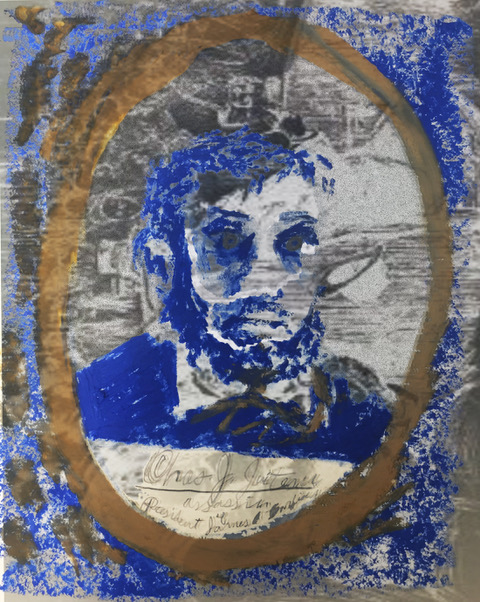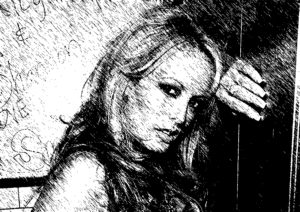Before he shot President James Garfield, Charles Guiteau—sometime lawyer, sometime bill collector, sometime evangelical, sometime utopian—shifted in the margins, wracked by dreams of belonging.

Journal Note, April, 1865: I couldn’t remember who I was. I remember there was someone I had to be, but couldn’t remember how to go about it. I watched, and tried to remember. I had always been in possession of extraordinary talents, depths of aptitudes. I penetrated the souls of crowds.
In the garden, Dr Noyes took me aside—he came to us in confidence, a prophet humble and generous—and gave me to understand that I was a student of uncanny closeness to the glory of God. In those times we felt Him palpable in the rooms and gardens of our settlement. On worship days we tumbled noisily from the quarters and knelt in attendance with Dr Noyes—his high-pitched voice carried across the hall in considered cadences, we prayed fervently that we would come closer to perfection in ourselves. I admit sometimes it eluded me: perfection, its concept drifting from my thinking. I could be lazy and covetous. Mean in thought. I slept late abed, pondering what my talents could accomplish in the world. In the colony, our hands were implements of labor, but often I neglected the crops in favor of reading and thinking, philosophizing, coming to understand God had made for me a sphere more venerable than my that of my fellows.
*
Journal Note, April, 1872: The promise of sharing the proximity of Mrs Hayes in the garden for a period of time was a luxury not to be taken for granted; one morning, a February it might have been, I discerned her through the pane. She must have woken early, in bloomers and wool jacket she was tossing grain to a half a dozen ducks and as many geese. A glaze of new-formed ice was upon the pond, the early sun gray-violet upon it. Her feet had left delicate prints upon the frost. Her scent of jasmine stirred me even in the morning’s chill. Doubtless she apprehended my approach, but did not turn to greet me. I thought to tell her honestly I had observed her on numerous occasions, and believed we had much in common. But I stammered, the words were like rocks in my mouth. She could be indulgent to others; I objected to her to being so with me. Charles, she said. It was like that. A single syllable that possessed meaning beyond that of paragraphs. Feeling an agony that subsided only in its challenge, I plunged my hands into the pond, so she might observe me, then held them up in prayer, awaiting some signal. I would have stabbed myself had she asked. Later I poured water from pails into the basins in the house. But she had gone elsewhere. Had Mrs Hayes seen me whole, perfect in His sight, as Dr Noyes had said, she willingly would have joined her soul with mine in union of His love, and I in possession of her jasmine scent. It puzzled me that she should smile in those moments of our passing, but speak so few words. Other women in the colony were prettier, livelier perhaps, than Mrs Hayes—I approached them to share the wisdom of Dr Noyes, in carnal love—but they were unworthy of the colony’s mission, and shied of my conversations with them. I prayed and studied. I was wise in God, but others misconstrued piety for self-righteousness.
Journal Note, April, 1880: Kinesis supersedes caution, desire elevates to the imperative, inevitably. Meaning? I’ve cast about long enough, looking for a true self. Who am I? A true American. A quester. Pursuer of perfection, like any American. Adaptable. Disappearing into crannies, folded into the landscape. Coming up again. Toward becoming. The mind becoming, reaching newer peaks of perfection. To be a soothsayer, a deliverer and diviner.
Bivouacking upon the depraved island, I walk among fishmongers, purveyors of fly-specked beef carcasses on hooks, the men fat on graft and money-hoarding, women in their petticoats and rouge on their cheeks. They do not see me. They see me as a character on the fringe. An outlying devil. But, lo, priests and poets and visionaries appear as lunatics before their visions are attained.
My rented room is small, comfortable. I am operating now as an influencer. Making utopias of ash heaps. I wander streets, starting conversations. Manhattan’s a republic of its own, I see, in possession of corrupt and vile economies. On street corners I make speeches in support of the candidate, including exhortations, felicitous phrases, and am met by hundreds, thousands, who congregate to hear my words. Afterwards, men congratulate me. Women offer themselves willingly. I smile, shake their hands, return to my room to labor. The general, the candidate, too walks the streets. I see him about town. He greets me in hallways with familiar smiles. His broad shoulders and corrugated Republican beard identify him, like me, as a man of particular destiny, and we recognize each other as colleagues, coequals in stature.
My attempts to visit the candidate are met courteously, and I am certain he is coming to understand that my speeches will assure his election to the highest office in the land. In acknowledgement of my services, I humbly anticipate nomination to a prestigious position. I must be prepared. I must accept the responsibilities. Ambassador. In preparation I look in the mirror, comb my beard in the Hapsburg style. In Vienna I shall be expected to attend the opera, and stroll through the vorstadts on Sunday afternoons. I shall pick up the language of the courts, form alliances with archdukes, I shall be remarked upon as a man of distinction. I do not pretend to chose this particular fate, but as it choses me, I must accede. I ready myself, marching back and forth in the rented room.
Journal Note, April, 1881: from new temporary quarters, I stride across L Street, then past the Willard, and mount the Columbia streetcar, shivering off spring drizzle that insolently drenches my shoes and jacket. I must find a suitable coat, I remind myself. One that accents my physique, and sheds the severest rains. I must preserve myself from rogue forces that alter what is to be. At the Executive Mansion, I excuse myself, pushing ahead of the crush of petitioners. The secretary, the small impertinent clean-shaved man, knows me, my name, the position I am to assume. The president is indisposed to see me, he tells me in a voice of rigid foolhardiness. I know who I am to be, I say to him, I am seeing with clarity less clouded than ever in the forty years my life. His future too, I say with an excess of politeness. I can be courteous if desired, but he presents a barrier to his own future. I am speaking to him with the patient generosity of a friend. Through the open door the president is glimpsed in intimate conversation with another. I signal to him, to inform him of his secretary’s impertinence. The door is closed. I swipe the visitor log from the unworthy secretary’s desk. My mind clouds, I dwell in tempests of indignation, I am boxed out of destiny, without choices.
Mrs Hayes used to express sympathies for the ants she chanced to step on, for lowest of worms, but her kindness, I knew, was so general in its feeling that it was lost in its diffusion. Her hair was auburn, in summer grew lighter in the sun, and her smile slipped upon her lips as if by chance. When I departed the colony for life more amenable to my talents—lawyering, lecturing on subjects on which I’d become an authority—she deigned not return the congenial letters I wrote to her. The Oneida colony stinks with the hypocrisies of free intramural affection, mutual criticism, the assorted claptrap produced from the brain of that lunatic, Dr Noyes. I can think now of Mrs Hayes with some residue of affection, but the torment is hers, sad her failure to respond to my care for her. I wonder if I saw her in the capital today I should not refrain from striking her with my cane.
My room, unacceptable, is abandoned, I shift temporary residence in the early hours, avoiding detection of the night managers. Then shift rooms again, avoiding other managers. I retrieve damp newspapers from a park bench—yesterday’s. The president’s comings and goings are listed therein, theaters he attends, trains he rides to the New Jersey shore. Tomorrow I shall spend carefully on the day’s edition, and shall come up to him, greet him, so he’s sure to remember our meetings. He goes out with the usual retinue, cronies and henchmen. Sometimes takes his carriage with only the driver for company, taking the air with a petulant shrug of one assured of his stature. His beard grays, eyes shift. I set out from the station depot to observe, sometimes pace behind him at a fair distance, observing his movements as a scientist does his specimen. I see him, but am avoided by him. He is humiliated by not acknowledging that my efforts, my speeches in his support, insured his ascension to his high office. If it befalls me to preserve the republic, if I am to be savior come late to our century, I ought not but accept.
A beautiful revolver, ivory handled .442 British Bulldog, has come into my possession. I carry it about in a satchel or pocket. I conform to its meaning, its whispered language. Along the river by a stand of willows I practice, the revolver’s reports no less resounding than thunder of brigades. Silences come as their wont, all spirit in the voids. Nights, star-lit, bend to me. It declares itself, we together shall be known, a singular implement to make way for some closer iteration of perfection, as Dr Noyes once preached. It shall—the revolver—become a relic, like splinters of the true cross. Yea, a pure American relic. It must be. George Washington’s walking stick. As for position offered, the question shall be settled, I will accept my due as my duty. May Mrs Hayes read my name in the newspaper, and revere me as an ambassador in fine morning coat, shoes of patent leather, and loathe herself for her indifference. She will know me. They will see me. They will know of my name.
Garfield turns corners, pacing ahead of his companions. A self-deceived man, he conceives that his destiny is his to command. He whistles a jaunty tune. He looks round to me with no especial concern. As I’d want. His eyes remember me. The smile sunk in his beard is for me. Does he hold out his hand for me? Destiny is unsparing. Overrules the actors. In the instant of my fame’s achievement, the instrument and I become singular in our interception of an instant where the president lives. Screams of women prolong— I could not have predicted that sound. I could not have known how a trigger click alters matter. He twists as he falls, like a child, he looks at me and mouths my name. I am soon to take my place, Vienna, Paris, I dine inside palace walls, my story is told to wide acclaim, I am a man of repute. I am known by all, I strut and dance, my destiny free of the unwieldiness of commonplace moderation.











